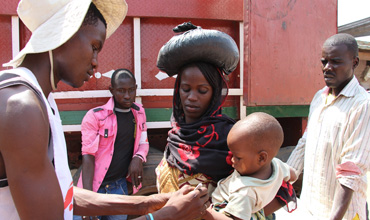An Assessment of the Psychosocial Effects of Almajiri system on Child’s Development in Gwange Ward Maiduguri, Borno State, Nigeria

Abstract:
Children are known to be the source of joy in every
family especially when the parents can afford their basic needs. Children in
the northern part of Nigeria are prone to deprivation through almajiri system
of education mainly due to respect for misunderstood religious concept and
culture among other causes. This study of psycho-social effects of almajiri
system on child’s development was conducted in Gwange ward, Maiduguri, is aimed
at identifying the psychological effects of almajiri system on child’s
development as well as the social effects of almajiri system on child’s
development. A descriptive design was used for the study. Data was obtained
from respondents (almajiris) using structured questionnaire. The data was presented
and analysed using descriptive statistics. Hypotheses were formulated and
tested using Chi-square. The findings of this study revealed that the almajiris
are affected both psychologically and socially due to lack of adequate care,
loneliness, feeling of anger, lack of proper feeding and security, exposure to
dangers and negligence by the society. Based on these findings, community
health workers, psychologists, sociologists and government should be in the
fore front of taking care of the almajiri system. Recommendations were made to
families, communities, government and Non Governmental Organisation’s on ways
of improving the system and incorporating it with western education.
Keywords: psychosocial,
effects, almajiri, development
References:
[1]. Abdulrafiu, L, (2009).
Almajiri-Breeding Future Terrorists. Tell, magazine. Available at www.citizensfornigeria.com/index.php/action/item/617-almajiri.
Accessed on 20/06/2015.
[2]. Abdullahi, M. (2011) The Almajiris : Nigeria
Child Beggars 2011. Available at www.the-almajiris-nigerias-child-beggar Accessed on 20/07/2015.
[3]. Bello, A. (2006) the almajiri syndrome:
religion, culture or menace. Expert from paper presented, Kano Nigeria
[4]. Christian, Pure foy (2010). Nigeria's
Almajiri Children: Learning a Life of Poverty and Violence. Education Data for Decision
Making. Abuja.
[5]. Dukku, A.(2009): Almajiri- 10million kids
begs in the north. Available at www.nairaland.com Accessed on 15/08/2015.
[6]. Federal Government of Nigeria (2004).
National Policy on Education. Lagos: NERDC Press
[7]. Hassan, I& Moses, A.(2010). From to
Madarassa: The transformation of Almajiri. Gbooza Mobile. Available at www.gbooza.com/m/discussion. Accessed on 23/08/2015.
[8]. Ibrahim, S. (2008). Menace of street begging
in Kano State. Available at http://www.nationaldalies.org Accssed on 14th June, 2014.
[9]. Kabiru I. (2012). The north and almajiri
phenomenon. Available at www.gamji.com/article8000/NEWS8282.htm
[10]. Kano State Government (2012) Report of
Committee on Almajiris.
[11]. Kopoka, A. (2000). The problem of street
children in Africa (A paper presented at the international Conference on Street
Children and Street Children’s Health in East Africa, Held in Dare-es-sala, Tanzania.
[12]. Nura. M.(2010) Almajiri- breeding of
future terrorists. Available at www.nairaland.com.
Accessed on 10 August, 2015.
[13]. Obioha, E. (2009) Becoming a Street Child
in Poverty Ridden Society: A Descriptive Case of Kaduna Metropolis, Nigeria. Journal of Social Sciences, 19, 41 -49.2009
[14]. Peace, U. (2012). The Need to Remodel
Almajiri System in Nigeria. Available at http://desertherald.com/?p=1434.
Accessed on 12/12/2014.
[15]. Tafida U.A. (2008). lead debate on the
almajiri bill for establishment of the national commission for the eradication of
child destitute. Blogspot.com
[16]. Think Quest (2010). Child Abuse in Nigeria. Available at http://library.thinkquest.org/06aug/00168/history.html. Accessed on 12/12/1014
[17]. Yahaya Suleiman (2004). The Amajirai and the Rights of the Child to Education Towards Sustainable Development: Education for Sustainable Development in Nigeria, A book of Readings Vol. 1. Minna : Niger State College of Education.

